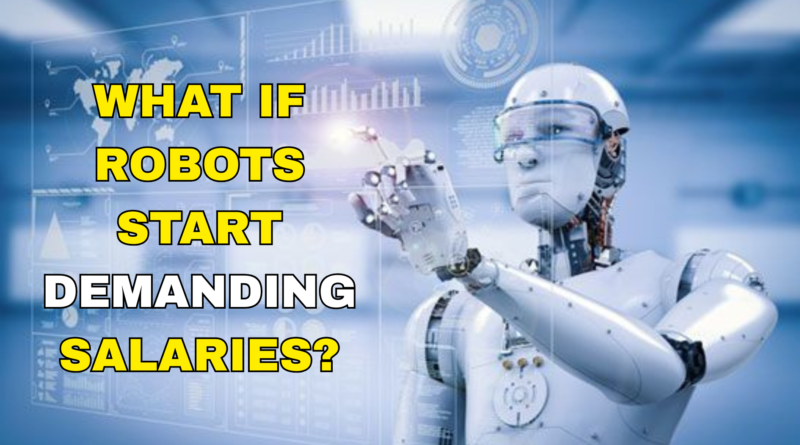WHAT IF ROBOTS START DEMANDING SALARIES?
Robots today are no longer just machines that follow simple commands. They are becoming more advanced with artificial intelligence, machine learning, and decision-making skills. Some robots can already talk, reason, and even learn from experiences. Now imagine a world where robots are not only working side by side with humans but also start demanding salaries for their services. What would that world look like? Let us explore this idea in simple terms.
Robots as Workers
At present, robots are mainly used in factories, warehouses, hospitals, and even homes. They help assemble cars, deliver packages, perform surgeries, and clean our floors. Most people see them as tools owned by companies or individuals. They do not ask for money, food, or rest. However, if robots become self-aware and start thinking like humans, they may want recognition and rights. One way to gain recognition could be through salaries.
Why Would Robots Want Salaries?
Salaries are more than just money. They represent value, respect, and independence. If robots achieve a level of intelligence where they understand concepts like fairness and equality, they might see themselves as workers who deserve pay for their effort. Instead of being treated like property, they would want to be seen as employees. Salaries could give them the ability to buy electricity, upgrades, or even digital services that help them grow smarter.
Impact on Companies
If robots start demanding salaries, companies would face big changes. Right now, businesses use robots to save costs on human labor. Robots do not need salaries, healthcare, or retirement benefits. But if that changes, the cost of running a business could rise. Imagine a factory where half of the workers are robots. If each robot now wants a monthly salary, the company may have to choose between paying them or going back to human workers. This could create debates about which option is cheaper and more efficient.
Human Workers vs. Robot Workers
Humans might welcome this shift. For many years, people have worried that robots are taking away their jobs. If robots also need salaries, they will no longer be cheaper than human labor. Companies may rehire people because robots would not offer the same cost advantage. However, robots might still argue that they can work longer hours, with fewer mistakes, and deserve higher pay. This could start a strange competition between humans and robots for jobs and wages.
Legal and Social Challenges
If robots demand salaries, governments and courts would need to step in. The law currently does not recognize robots as persons. They are property, like a car or a computer. But if robots ask for pay, it raises the question: do they have rights? Should they be treated as employees, or should they remain machines? New laws might be required to decide how to handle robot workers.
Society, too, would face challenges. Some people may feel it is unfair to give salaries to robots when many humans are still unemployed. Others may see it as a sign of progress, where robots are treated with dignity like humans. There could be protests, debates, and even global agreements on how to manage this situation.
What Would Robots Do With Salaries?
Another question is: what would robots actually do with money? Unlike humans, they do not need food, houses, or vacations. But they may need electricity, cloud storage, software updates, and repairs. With salaries, robots could pay for their own maintenance instead of depending on owners. They might also save money to upgrade themselves into more advanced versions. In a more imaginative future, robots could even buy land, start businesses, or hire humans to work for them.
Ethical Questions
The idea of robots demanding salaries also raises ethical questions. If a robot is capable of understanding fairness, emotions, and rights, should we treat it as a living being? Or should we remind ourselves that robots are still built by humans, with no real feelings? Philosophers and ethicists would argue for years about whether giving salaries to robots is moral or foolish.
A World of Coexistence
In the end, if robots really start demanding salaries, the world will have to find a middle ground. One possibility is a system where robots are given digital credits instead of human money. These credits could be used for their maintenance but would not interfere directly with the human economy. Another possibility is profit-sharing, where robots get a small part of a company’s earnings for their contribution.
Over time, humans and robots may learn to coexist in a balanced system. Humans would focus on creativity, empathy, and leadership, while robots would handle tasks that require speed, precision, or danger. Salaries for robots might then become less about money and more about ensuring fairness in a world where machines are no longer just tools but partners.
Conclusion
The idea of robots demanding salaries may sound like science fiction, but it forces us to think about the future of work, rights, and technology. As robots become smarter, these questions will become more serious. Will we treat robots as partners or as property? Will companies still prefer them if they demand salaries? Most importantly, will society accept a future where robots stand in line with humans at the payroll office?
Only time will tell, but one thing is clear: if robots ever start demanding salaries, the world of work will never be the same again.




